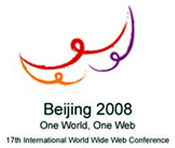Linked Data on the Web, WWW2008


With my colleague Tom Heath one of the co-chairs, a paper (pdf) from colleagues Rob Styles, Nadeem Shabir and (the absent) Danny Ayers, and a paper (pdf) from myself, Rob and Tom, my choice of workshop was an easy one to make; Linked Data on the Web.
Tom outlined some of his hopes for the day in a recent article, and the workshop website explains;
"The Web is increasingly understood as a global information space consisting not just of linked documents, but also of Linked Data. More than just a vision, the Web of Data has been brought into being by the maturing of the Semantic Web technology stack, and by the publication of large datasets according to the principles of Linked Data. During 2007, the size of the Web of Data has grown to several billion RDF triples which are served by a network of interlinked data sources and which cover domains such as geographic information, people, companies, online communities, films, music, books and scientific publications. In addition to publishing and interlinking datasets, there is also ongoing work on Linked Data browsers, Linked Data crawlers, Web of Data search engines and other applications that consume Linked Data from the Web."
Opening the workshop, Sir Tim Berners-Lee emphatically declared,
"Linked Data is the Semantic Web done as it should be. It is the Web done as it should be."
Presentations throughout the day went a long way toward validating Berners-Lee's opening assertion. Many - on their own - only described a small part of the problem space, and few - on their own - would have proved compelling to those not on the 'inside' of this group. Brought together, though, the collection of resources, ideas, and demonstrations clearly illustrated the potential of a web on which distributed data are drawn together programmatically in order to enrich the user experience.
With the notable exception of Renault's François-Paul Servant, the emphasis remained very much one of experimentation and research. As we move to the next phase, a number of assumptions need to change, and 'inconvenient' practicalities such as licensing, permissions, sustainability, persistence, and quality become increasingly important. The ad hoc mashup that, perhaps, doesn't fully respect the letter of a third party's terms and conditions may be acceptable for a demonstrator or proof of concept; the proposition becomes radically different when a service is being delivered to, by, or from an enterprise.
Fundamentally, as Berners-Lee has seen, the work of the Linked Data projects points to a very different way of thinking about the role that data plays in enabling the next phase of the Web. Many of today's Web applications actually act in very similar ways to traditional offline applications; a single application uses a single user interface to provide access to information from a single store of data. That store of data may now be remote to the user, but the value of linkages is certainly not leveraged. The Linked Data projects demonstrate something else; any number of applications, exposed via any number of user interfaces (and machine readable apis), drawing upon data stored across the Web in any number of stores.
Working through the implications may take a while, but we saw some good starts yesterday, and repeated calls from OpenLink's Kingsley Idehen to 'make it real.'
Update: My colleagues Rob Styles and Nadeem Shabir provide their perspectives on the workshop. Other attendees sharing their perspectives include Alexandre Passant.